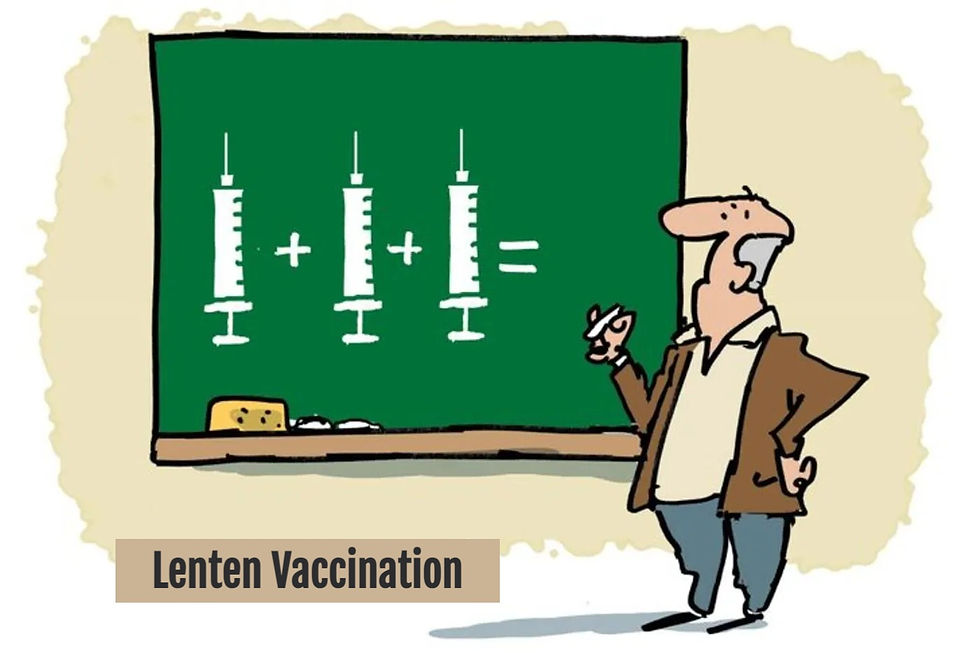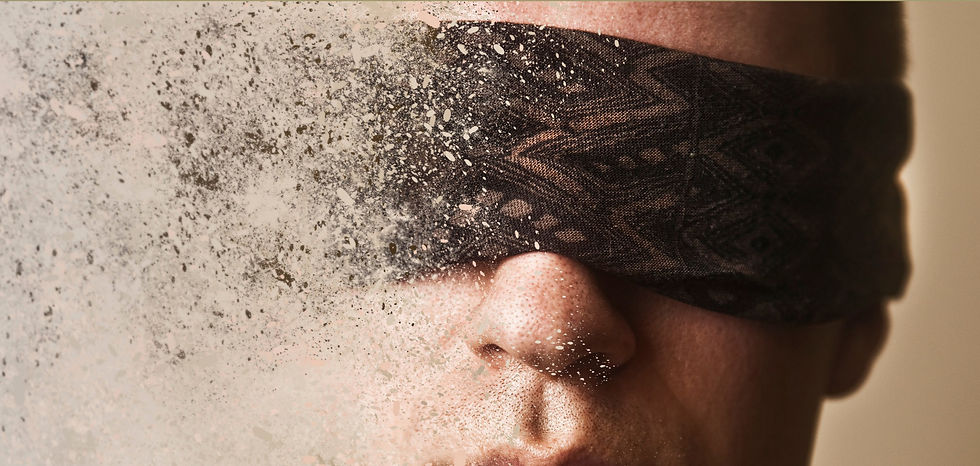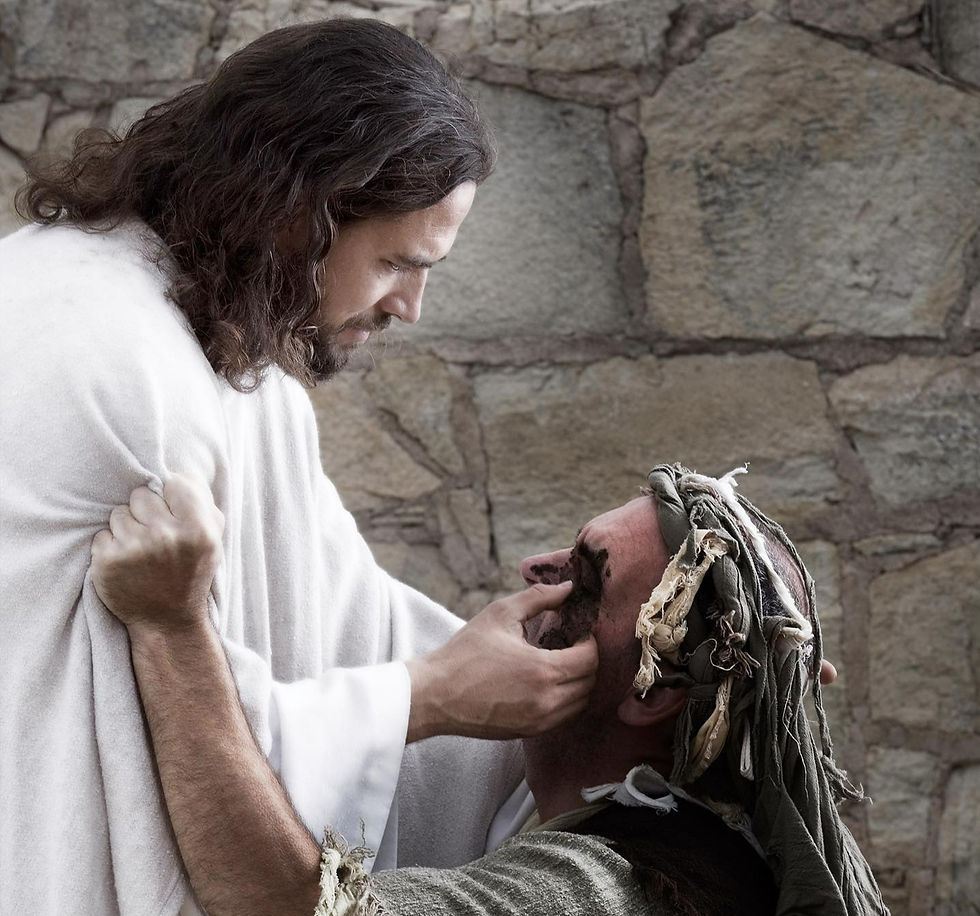Your 3-dose Lenten Vaccination
- Charles
- 17 mars 2023
- 4 min de lecture
Reflections for the Fourth Sunday of Lent (1 Samuel 16:1b, 6-7, 10-13a, Ephesians 5:8-14, & John 9:1-41)
The readings of this Sunday propose a 3-dose vaccination plan to help us combat the many variants of blindness that hinder our Christian discipleship.

First dose - A new understanding of ‘misery’: The Gospel introduces us to a man born blind, forced into poverty, isolation, and begging in the Temple. He has never seen light in his entire life. Colours and appearances meant nothing to him. The only world he knew was one shrouded in darkness. Understandably, therefore, the disciples interpret his misery as divine punishment. They ask Jesus, "Rabbi, who sinned, this man or his parents, that he was born blind?". How often and how easily do we interpret sufferings, illnesses, tragedies, and challenges as God’s punishment for sins? When faced with difficult situations, don’t we ask “why is God punishing me?” Aren’t we quick to explain the pain of a neighbour as a ‘deserved’ compensation for his past sins?

The response of Jesus is revelatory: "Neither he nor his parents sinned; it is so that the works of God might be made visible through him”. Jesus proposes a new way of understanding the relationship between sin and suffering: while sin does lead to suffering, not all suffering results from sin. In this perspective, the blindness of this man is interpreted not as a curse but as an opportunity for the manifestation of God’s might. And therefore Jesus enters action mode right away: “We have to do the works of the one who sent me”. It is indeed better to light a candle than curse the darkness.
Second dose - Meeting with the ‘master’: This second dose is administered in two stages: first, Jesus makes clay with his saliva and smears it on his eyes, and second, he is sent to the Pool of Siloam. John Chrysostom interprets both these gestures as meeting points with Christ. Firstly, the saliva of Jesus represents divinity and the sand symbolises humanity. The mix of divinity and humanity becomes medicinal to the blind man’s misery. Here, he sees a parallel to the Eucharist elements of bread and wine, products of the land which become medicine to our miseries when it is mixed with the grace of consecration. Secondly, Siloam, meaning ‘sent’ refers to Jesus, the one sent by God to liberate the world from darkness. Chrysostom insists that the washing of the blind man in the ‘one who is sent’ refers to baptism. We are buried with him and we rise with him in baptism (Romans 6:4).

Eucharist and baptism thus become effective ways of meeting Christ today in our concrete lives. Just as the medicinal clay and the saving dip helped him meet the master who liberated him from his miseries, Jesus uses the sacraments of the Church to embrace us, liberate us, and help us become fully human. Does our participation in the sacraments often become mechanical, indifferent, and disengaged? The liturgy challenges us to embrace the meaning of what we celebrate (lex orandi), the significance of what we profess (lex credendi), and their implications for our way of life (lex vivendi).
Third dose - The gradual ‘miracle’: John is careful to indicate that the blind man is healed not only from his physical blindness but also from his spiritual blindness. We can discern four stages in this miracle of healing from the words he chooses to refer to Jesus. During the enquiry conducted by the Jews, he first refers to Jesus as ‘A MAN’; the second time, he calls him by the name ‘JESUS’; the Third time, he calls Jesus a ‘PROPHET’; and finally after he meets Jesus, he declares him as Lord and worships him. Just like his physical healing, his spiritual healing is also gradual. Our healing too is a process that we engage in with God. There are no quick fixes, shortcuts, or roundabouts. God is patient with us so we can cooperate with him in our healing process.

The gospel ends with a beautiful irony: “I came into this world for judgment, so that those who do not see might see, and those who do see might become blind". The same light of Jesus shines on the blind man and the Jews but the results vary. The man gains vision while the Jews lose their sight. Yes, the light of Jesus shines on us constantly but it is for us to open our eyes of faith to receive this light and see his presence and power active in our lives. The question of Jesus, “Do you believe in the Son of Man?” is not an intellectual question. Faith is never just an intellectual response to God. It is a call to a relationship responded with love. This Sunday, let us prepare ourselves for our own 3-dose vaccination: understanding challenges as opportunities; hastening to meet the master in our worship, faith, and life; and marching forward with God in our gradual healing process.




Commentaires